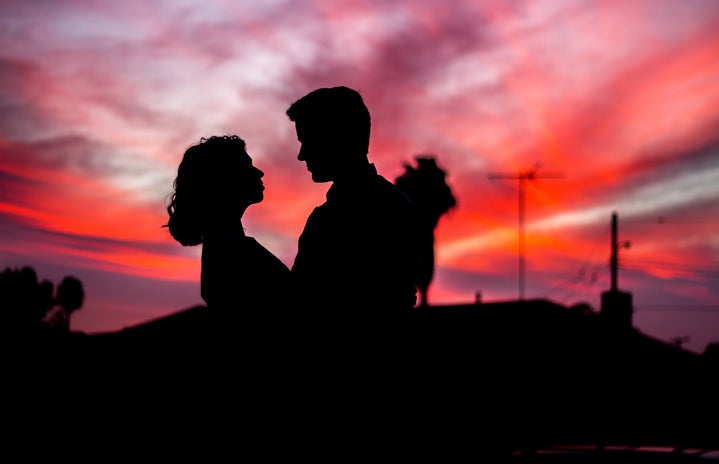Currently interracial relationships are seen as this social phenomenon. They are continuously being fetishized and commodified and this outlook strips away the conversations that as a society, are more worthy of being talked about, such as how power operates in our intimate relationships and spaces. We have grown used to seeing interracial relationships through this lens of consumption and commodification, especially if we take into account popular interracial relationships through TikTok and Instragram — from all the Kardashian/Jenner’s, to #mixedfamily and #interracialcouple, the discourse about these couples is cringeworthy and noxious.
I, a white-Canadian female, born to a Scottish mother and a mixed-race father, began dating my Indian boyfriend almost a year ago. Born and raised in the state of Punjab, he speaks three languages: Punjabi, Hindi, and was taught English during his Christian-school education, however, his parents are not able to speak English. He immigrated to Canada when he was young, fresh out of high school and awaiting college. On December 24th, 2017, he arrived at Toronto’s Pearson Airport. The next year, he began his studies at Centennial College in Hotel Management studies.
Being new to the country, he experienced many shocks. He had never seen a white person in real life before. He says that India is not a very racially diverse country but a religiously diverse one, so he had never seen a white person aside from the TV screens of his favourite dubbed television shows. He worked odd jobs here and there (but could only work under 20 hours per week because of his permit) until he landed a job at a Shoppers Drug Mart, where he met me. We began chatting and opening up to one another about our different life experiences and environments. For instance, while I was exposed to the cold, he was not and coming to Canada, especially in the dead of winter on Christmas Eve, was a challenge for him. It was his first time seeing snowfall and his first time buying a winter coat. We also grew up eating different foods. While I was accustomed to a variety of foods, he mostly grew up eating Indian food – his favourite being butter chicken. It was funny, though, that we grew up watching the same TV shows on Disney – his just in a dubbed Punjabi version.
It was shocking to him how open and accepting I was. He admitted, “I never expected a white person to talk to me or befriend me,” and this was because of previous experiences he had with white people upon arriving in Canada. He experienced mass amounts of discrimination and racism for being Indian and an immigrant. From being told to “go back to his country,” to the assumption that Punjabis are “rude” and “disrespectful,” he felt unwelcomed and sought comfort in his own community. Because of this, he never tried to find people outside of his community, but having a warm and welcoming experience with me was new for him, and it made him feel extremely appreciated and comfortable. After years of connecting and opening up, learning of his experience and how to make him feel comfortable and secure, the two of us began dating.
One thing I noticed right away is that the relationship between a white person and a person of colour is the focus of most conversations. Yes, of course, it comes up in conversations me and my partner have had—because it is important for me to understand his struggles and experience—but we have also had conversations about language barriers, feeling welcomed in each other’s community and circles of friends, family values and relationships, and advocating for one another. It has been extremely important to me to understand his language, participate in his traditions and holidays, and to learn to communicate with his friends and family in a way that they are comfortable and ensure that my presence, as a white person and what that stands for, is not making their safe space and community unsafe. But race is not the most important aspect of our relationship, and although we acknowledge that we are different races, everyone around us always feels the need to remind us. “””Wow, you’re dating a brown boy!”, “Wow, your girlfriend is white!”, “Are you sure you’re from India?”, “There’s no way you’re dating an immigrant,” “Invite me to the Indian wedding,”; continuously pointing out that he is brown and I am white.
It is even worse when we are out, and people never realize we are together, unless we are standing close or holding hands. People always assume we are not a couple because we’re two different races and when they do, oh boy, do they stare. They stare hard. Sometimes, especially from old white people, it’s looks of disgust, young people smiling, or old Indian mumma’s and papi’s doing a double-take to make sure it’s a real couple, or others looking straight up confused and bamboozled.
One thing my boyfriend gets a lot of comments about, especially from his family back home in India and some friends here, are comments about marriage. “You should put a ring on her soon,” “When I was your age, I was already married with a child,” “You cannot wait much longer,” “Do it before you’re too old,” are comments and pressure my boyfriend gets regularly. Because marriage is a huge part of Indian culture, it is something that is often pushed on him (and many people) to do, even though neither of us are ready to get married so soon. He also gets the comments about how beautiful our mixed kids would be and how “lucky” his parents will be to have beautiful grandchildren. He knows they mean well and are happy for him, but these comments became more prevalent to him when he began dating me.
But for me, it’s the opposite. I come from a white household. While my dad’s side of the family is Jamaican, my mom’s side is Scottish, and I know my mom faced issues when bringing my dad home to meet her parents for the first time because he was mixed (and this was only in the ‘80s and early ‘90s). But my grandparents grew up in a much older generation where mixed couples were not talked about and where it was much more segregated. However, my mom’s family loved my dad and welcomed him with open arms – but I know I have some family who would not be comfortable with my Indian boyfriend coming over, strictly for the fact he is Indian and the stereotypes and racism they have towards Indian people and people of colour. In fact, I have a family member who once told my younger cousin that she can bring home any boy she likes, just not an Indian; they would not be welcome in our family. I have also been asked about being “used” by him to get his permanent residency and a way to stay in the country. As someone dating an Indian man, I am conscious of these thoughts in my family and do all I can to make sure he does not ever face these comments. I always ensure that he is only around people in my family that will love and respect him the same way I do, because I would never want him to be made to feel uncomfortable and have past-traumatic experiences arise because of some racist white people.
My entire life, I never even thought about the colour of someone’s skin when it came to dating. When I met my partner, I was worried I would have a hard time navigating his customs, but it has been a learning experience for both of us; for me, adjusting to his customs and introducing him to mine. After knowing each other for over four years and dating for almost a year, he has taught me some of the most important things about being an interracial couple.
Advocacy is key. “Why do Punjabis sound angry all the time?”, “You now have a white token and can get away with anything because of your girlfriend’s privilege,” “Is he going to force you to get married,” – are only some of the phrases my partner and I have heard, and none of them are acceptable. What we have both learnt is that not being racist is not enough; being anti-racist, advocating for change, and calling others in is what makes us both feel supported in our relationship as an interracial couple. An essential part has always been communicating; asking questions, setting boundaries, and discussing the hard issue has been essential for our relationship. Especially because we have to have tougher conversations than a relationship where people are of the same race. We cannot ignore the conversation about racism, language barriers, traditions and holidays, morals, family values, discrimination, and life experiences.
We have also learned that it is okay that there are things that you will never understand. My partner and I had (and will continue to have) a fair share of things that we will simply never comprehend – and that is okay, as long as we continue to have respect for one another. I will give you an example. I grew up in Scarborough, a very racially diverse neighbourhood, where I was friends with Black people, Indian girls, Filipino boys, and kids of all backgrounds. He did not have that same experience as I did living in Punjab because everyone around him was Punjabi, spoke the same language, ate the same foods, and celebrated the same holidays for the most part.
When he first met me, he did not think I was going to be so open-minded and accepting as I was because of his experience and knowledge about white people and historical racism, and so he stepped out of his comfort zone – and when I first found out and met his group of friends who were also Punjabi, versus when he met mine, who were all mixed, it created a conversation about comfort spaces and language. Did he feel comfortable in a diverse community space like the one my friends and I had created? Did I feel comfortable in the community he had? I had mentioned that I did not want to make his friends uncomfortable, because in their group of friends they had all spoken Punjabi – and I did not want to force the group to change their dynamic to fit my needs and speak English, so I could understand. Nor did I want him to translate everything. Even though they could all speak English, it did not feel right for them to change their language. So, we had a discussion about it and talked about this challenging subject – something not many people do. It was important to talk about because there are so many identities in our relationship: not only are we experiencing Punjabi and Canadian culture, but Scottish and Jamaican culture is in the mix from my family, and so it was important to understand things about each other and find ways to accommodate to it – and moreover, understand that there are things that we will never understand about each other. I will never understand his experience as a Brown man in Canada who had to experience racism and discrimination and growing up in a non-racially diverse area, whereas he will never understand growing up in a very diverse neighbourhood and how that shapes a person.
I have also learned that we are going to be talking about race for the rest of our lives, and that’s okay – it’s a part of who we are as a couple, and it’s important to be comfortable talking about it. It’s generally a topic we avoid discussing in society, but it’s super open and welcome in our relationship. And it’s definitely okay to be different; being different should not be feared, and I openly celebrate my Punjabi boyfriend, and he openly accepts and loves his Canadian-born girlfriend who happens to also be plus-size (a discussion for another time, perhaps), and it’s magnificent that we are both not the same. The biggest takeaway of all is that what people think is none of my business – I cannot choose who I have a connection with. Love often comes unexpectedly and looks completely different from what we tend to have in mind, but true chemistry knows no boundaries. Yet, I hope to continue teaching people, especially those who are closed-minded, that people who are very different can get along, love each other and co-exist. From culture to skin colour to nationality and language – we are all human; we all want to feel loved, and I just happen to love a man who was born in India.


